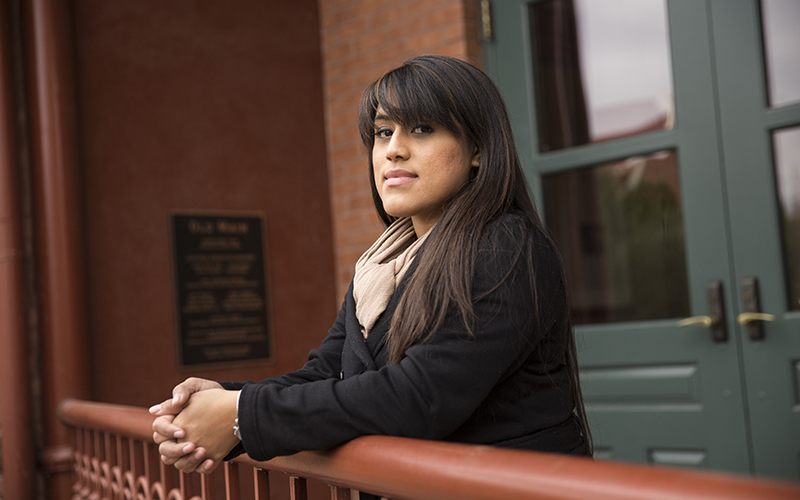
Elizabeth “Ellie” Pérez, 26, is a DACA recipient and a justice studies senior at Arizona State University, and is now looking at law schools where she hopes to focus on labor law. Her family came to Arizona in 1995 when she had just turned 4. (Photo by Johanna Huckeba/Cronkite News)
PHOENIX – As President Donald Trump signs a flurry of executive actions, DACA students anxiously wait to find out their fate. During the presidential campaign, he promised to put an end to the program that protects undocumented immigrants from deportation if they were brought to the U.S. as children.
“If DACA gets repealed, I honestly don’t know what will happen,” said Elizabeth Perez, a student at Arizona State University.
She’s among 740,000 young people in the U.S. granted protection by former President Barack Obama’s executive action that created the Deferred Action for Childhood Arrivals. At least 30,000 DACA recipients live in Arizona and 12 percent of those are students in Maricopa County.
To qualify they must be enrolled in school or have graduated from high school, completed a GED or been honorably discharged from the military and not have a criminal record. The executive action means they’re eligible for work permits, driver’s licenses, and in some cases in-state college tuition.
“I became the first dreamer to work at the City of Phoenix because of my deferred action. And I left my house in a blazer, and my mom was so proud of me,” said Perez, tearfully.
Prior to DACA, she and other students paid out-of-state tuition. Perez says she spent years cleaning houses so she could afford to pay the higher out-of-state tuition. It took her five years to complete her associate’s degree. Perez, a Justice Studies major, is set to graduate in May with a bachelor’s degree and plans to attend law school.
University presidents at Arizona State University, the University of Arizona, and Northern Arizona University have committed to continue support for DACA.
“We have a strong desire at every level of the institution to be as helpful as we can to create an environment where these students can have access to everything that the university has to offer,” said Michael Crow, president of ASU, during an Nov. 28 interview on Arizona Horizon.
A letter of support signed by 1,300 professors at Arizona universities and community colleges asks that DACA students continue to be eligible for in-state tuition.
“My advice to those students who have DACA right now is to renew,” said Karina Ruiz, president of the Arizona Dream Act Coalition. “We cannot guarantee that it’s going to go through but we tell them that we are here and we’re going to keep fighting for a solution.”
Despite a crackdown on illegal immigration, there are signs the Trump Administration could take DACA students into consideration. “He’s a family man. He understands. He has a huge heart and he understands the significance of this problem,” White House spokesman Sean Spicer said at a news conference Wednesday when asked about DACA.
Perez considers the U.S. her home. She grew up in Arizona. It wasn’t until high school that she learned she was undocumented from her parents.
Perez spends every Fourth of July watching the fireworks at Steele Indian School Park in Phoenix.
“I cry every year, because I know how lucky I am to be in this country,” said Perez.
Video by Adriana de Alba/Cronkite News.